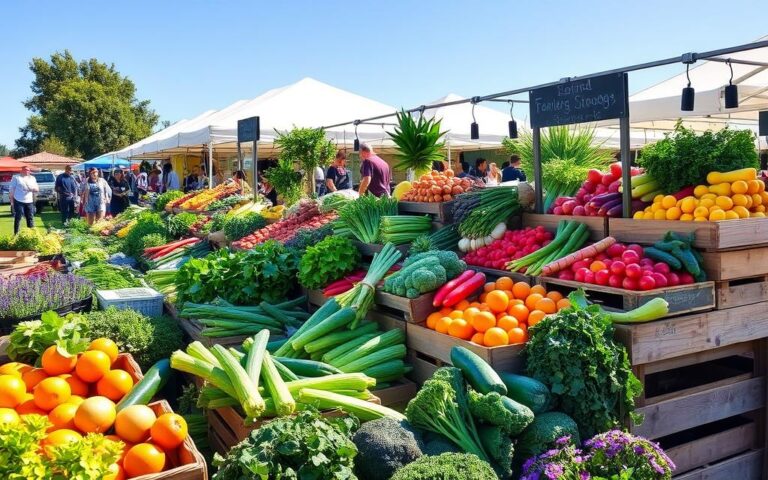More and more people are turning to a plant-based diet to help the planet. This diet cuts down on meat, which lowers greenhouse gas emissions and uses land better. Moving to a plant-based diet is good for you and the Earth.
This guide will look into the benefits of eating more plants and less meat. We’ll see how it helps fight climate change by changing what we eat. Let’s dive into this journey together and see how choosing plants over meat benefits us and the Earth.

The Environmental Impact of a Plant-Based Diet
Eating more plants is good for our planet. It cuts down the harm from meat production. Meat farms release a lot of greenhouse gases, about 14.5% of the world’s total. By choosing veggies over meat, we can fight climate change.
Raising animals for food also uses a lot of water, adding to our planet’s stress. For example, making a pound of beef takes about 1,800 gallons of water. But growing a pound of soybeans only needs 216 gallons. This shows how much water we can save with a plant-based diet.
Sustainable farming methods help our environment too. Practices like rotating crops, using fewer chemicals, and organic farming improve the land. They keep our ecosystems healthy and soil rich, ensuring we can grow food long-term.
By choosing plant-based foods, we each can make a big impact. We can reduce our carbon footprint and help our planet. Moving to a plant-based diet is part of a bigger change toward farming that cares for the earth. This change benefits us now and in the future.
Benefits of a Plant-Based Diet for Your Health
Switching to a vegetarian lifestyle offers many health perks. It focuses on eating fruits, veggies, whole grains, legumes, and nuts. These foods are packed with nutrients. They’re also lower in bad fats and cholesterol, which helps your heart.
Studies show that a plant-based diet lowers the risk of heart disease, type 2 diabetes, and obesity. This is because it’s high in fiber and full of vitamins and minerals.
Going plant-based makes it easier to manage your weight. Eating foods rich in nutrients makes you feel full without too many calories. Also, many people say they have more energy. This boost comes from getting more vitamins and minerals from whole foods.
To eat a well-rounded plant-based diet, here are some tips:
- Incorporate a variety of colorful fruits and vegetables for a broad range of nutrients.
- Explore plant-based proteins like beans, lentils, and quinoa to meet dietary needs.
- Choose whole grains over refined options for better fiber and nutrient intake.
- Stay hydrated with water and herbal teas, minimizing sugary beverages.
Getting Started: Assessing Your Current Diet
To start your plant-based diet the right way, you need to look at what you eat now. Start by keeping a detailed food journal. This will help you see your main habits, especially how much meat and dairy you eat. Knowing this makes it easier to switch to new foods later.
It’s also key to think about the emotional and social sides of eating. Food isn’t just about health; it’s tied to our emotions, families, and traditions. Keep this in mind as you change your diet.
When looking at your current eating habits, here are some helpful tips:
- Document meals over a week to spot patterns.
- Note feelings when you eat different things.
- Engage friends and family in your journey for their support.
- Research alternatives for meals high in meat or dairy.
Assessing your diet carefully is a big help in moving to a healthier lifestyle. Knowing your starting point makes changing your diet easier.
| Food Type | Consumption Frequency | Emotional Connection | Alternatives |
|---|---|---|---|
| Red Meat | 3 times a week | Comfort food | Jackfruit, lentils |
| Dairy | Daily | Family tradition | Almond milk, cashew cheese |
| Poultry | 5 times a week | Convenience | Tofu, seitan |
| Fish | Once a week | Health benefits | Chickpeas, omega-3 supplements |
Making the Transition: Practical Steps
Switching to a plant-based diet needs thoughtful planning. This planning should make changes smooth and support your lifestyle. Start by reducing meat and dairy slowly. First, look at what you eat now. Then, figure out what meals you can change. Replace animal products little by little. This approach makes things easier.
Planning your meals is key. Making menus for the week cuts down on stress. It also makes sure you get the right nutrients. Try to use different whole food plant-based ingredients. Every week, try new dishes with beans, grains, fruits, and veggies. This makes your meals more interesting. It also lets you try new foods.
Having the right ingredients at home is crucial. Keep your pantry stocked with basics like:
- Quinoa
- Brown rice
- Lentils
- Chickpeas
- Nuts and seeds
Also, go to your local farmer’s market for fresh produce. This helps you be more creative with your meals. It supports your choice to live a plant-based lifestyle, too.
| Food Group | Examples | Nutritional Benefits |
|---|---|---|
| Grains | Quinoa, brown rice, oats | Full of fiber, B vitamins |
| Legumes | Lentils, beans, peas | Packed with protein, iron |
| Fruits | Berries, bananas, apples | Rich in antioxidants, vitamins |
| Vegetables | Leafy greens, bell peppers, carrots | Full of nutrients, low in calories |
Following these steps will improve your move to a plant-based diet. Making changes bit by bit helps build long-lasting habits. It also makes eating more enjoyable.
Exploring Plant-Powered Eating Options
Switching to plant-powered eating can be both tasty and fun. A veggie diet brings lots of flavor and health benefits. It can suit many tastes and dietary needs. Trying new recipes is a great way to get creative in the kitchen. It also helps you enjoy meatless meals more often.
Here are some appealing options to explore:
- Vegetable stir-fry – Quick to prepare and packed with nutrients. Choose a colorful mix of vegetables and serve over brown rice or quinoa.
- Chickpea curry – A hearty dish that combines protein-rich chickpeas with flavorful spices and coconut milk, served with basmati rice.
- Stuffed bell peppers – Fill peppers with a mixture of brown rice, black beans, corn, and spices for a scrumptious and nutritious meal.
Adding meatless meals to your daily diet can boost your health and help the planet. Start by checking out plant-based foods at your local store. Look for options like:
| Category | Examples |
|---|---|
| Proteins | Lentils, beans, tofu, tempeh |
| Dairy alternatives | Almond milk, cashew yogurt, coconut cheese |
| Savory snacks | Nuts, seeds, hummus, rice cakes |
Making good choices makes it easy to eat well on a budget. Going veggie lets you try flavors from around the world. It’s all about mixing different spices and ingredients. Dive into plant-powered eating and discover delicious new foods.
Tips for Staying Motivated on Your Plant-Based Journey
Moving to a plant-based way of eating comes with its own personal challenges. But staying on track is key to making it work long-term. Here are easy tips to help you stay focused and true to your goal:
- Set Realistic Goals: Start with goals you can reach. Try out a new plant-based recipe every week. Or cut back on meat little by little.
- Track Your Progress: Write down how you’re doing. Note what’s going well and what’s tough. This can keep you going strong and lets you see how far you’ve come.
- Celebrate Small Victories: Cheer every win, big or small. It boosts your drive and commitment to living plant-based.
- Connect with Others: Find online forums or local groups about plant-based living. Sharing and getting support can make the tough times easier and keep you motivated.
Enjoying your journey makes it easier to stick to these changes. A positive view makes all the difference, turning challenges into chances for growth.
Here’s a motivational quote to inspire you:
“The journey of a thousand miles begins with one step.”
Community Support for Plant-Based Living
Being part of a supportive network can greatly improve your path to a vegan life. A lively plant-based community offers resources, support, and friendship. Meeting others who share your diet choices helps keep you motivated and eases the change.
Community members often share ideas and support online. They use forums and social media groups for swapping recipes, giving tips, and sharing stories. These online groups provide a space to ask for advice and feel part of a community, all while following plant-based diets.
Real-world meetups and events also play a big role. In many cities, there are potlucks, workshops, and talks from nutrition experts. These events are a chance to make friends and learn more about vegan living together.
- Online forums for recipe exchanges
- Social media groups for advice and tips
- Local meetups for face-to-face engagement
- Workshops on vegan cooking
- Community events promoting plant-based living
Being active in a plant-based community doesn’t just offer support. It also brings new ideas and experiences. Sharing your journey with others forms strong friendships and inspires a lasting commitment to veganism.
Educating Yourself on Vegan Nutrition
Learning about vegan nutrition is vital for those adopting a plant-based diet. It’s important to understand key nutrients like proteins, carbs, and fats. This knowledge helps you eat a well-rounded diet and avoid missing important vitamins and minerals.
When creating a vegan meal plan, aim to include diverse food types. This ensures you get all the nutrients your body needs. For instance:
| Macronutrient | Plant Sources | Recommended Intake |
|---|---|---|
| Protein | Legumes, nuts, seeds, tofu, and tempeh | 0.8 grams per kg of body weight |
| Carbohydrates | Whole grains, fruits, and vegetables | 45-65% of total daily calories |
| Fats | Avocados, olive oil, nuts, and seeds | 20-35% of total daily calories |
To learn more about vegan nutrition, look for trustworthy sources. Many organizations offer excellent dietary advice. Some renowned ones include:
- The Physician’s Committee for Responsible Medicine
- NutritionFacts.org
- The Academy of Nutrition and Dietetics
Dive into these nutritional guides on your vegan journey. They’ll help you make informed food choices.

Conclusion
Switching to a plant-based diet offers many advantages for personal health and the environment. It helps you live sustainably. Eating more plant-based foods cuts your carbon footprint and boosts your health.
Moving to a plant-based diet is a beneficial journey. You can enjoy a variety of plant-based foods and find others on the same path. Each step toward plant-based eating helps build a better future.
The plant-based trend is growing, promising a healthier world. Choosing plant-based foods improves your health and aids environmental protection. Your dietary choices contribute to profound impacts on health and the earth.
FAQ
What is a plant-based diet?
A plant-based diet focuses on foods from plants. This includes fruits, vegetables, grains, legumes, nuts, and seeds. It might have some animal products. But it mainly uses whole, unprocessed foods. This is for better health and to help the planet.
How does a plant-based diet benefit the environment?
Choosing a plant-based diet helps cut down on greenhouse gases. It also uses less water and supports sustainable farming. Eating less meat means less deforestation and better land use.
What health benefits can I expect from transitioning to a vegan diet?
A vegan diet boosts your health in many ways. You’ll eat more fruits and veggies. This can lower your risk for diseases like heart problems and diabetes. Plus, it helps with weight control. It’s all about eating plenty of plants.
How can I assess my current diet before switching to a plant-based lifestyle?
Try keeping a food journal to track what you eat. Pay attention to how much meat and dairy you have. This helps you slowly change your diet. It makes you think about why you choose certain foods.
What practical steps can I take to start my transition?
Begin by eating less meat and dairy. Plan your meals around plant-based foods. Try new recipes with ingredients like grains and veggies. Keep your kitchen stocked with these healthy options.
What are some good options for meatless meals?
For meatless meals, try vegetarian or vegan recipes. You can make salads, vegetable stir-fries, and dishes with legumes and whole grains. Finding tasty plant-based meals can be fun.
How can I stay motivated during my plant-based journey?
Set goals and keep track of your progress. Celebrate your achievements. Joining online or social groups for support can also help. They offer encouragement and tips.
Why is community support important for plant-based living?
Being part of a plant-based community is great for support. Online groups, local meetups, and social media can inspire you. They’re good for sharing tips and learning more about plant-based living.
Where can I learn more about vegan nutrition?
Learning about vegan nutrition is key to a healthy diet. Check out the Physician’s Committee for Responsible Medicine and NutritionFacts.org. They have lots of info on getting the right nutrients and avoiding deficiencies.




